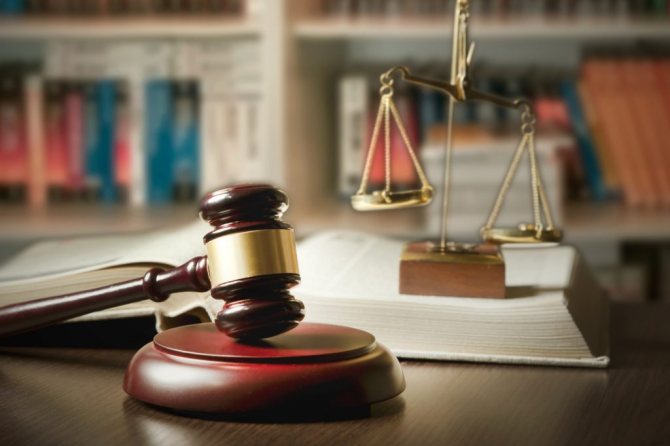When does the Consumer Protection Law apply?
If the buyer and customer is a citizen, and goods or services are ordered for personal and non-commercial needs, the legal relationship falls under Law No. 2300-1 “On the Protection of Consumer Rights”. This will affect the procedure for filing claims and resolving disputes, because:
- consumers are provided with benefits in paying fees and choosing judicial authorities to file a claim;
- Law No. 2300-1 and other regulations provide for increased penalties for violation of the rights of buyers and customers;
- there are special deadlines and rules for considering pre-trial claims from consumers;
- the use of alternative methods of protection is allowed (for example, in a dispute with the insurer, you can contact the RSA).
Important! The right to judicial protection is expressly stated in Article 17 of Law No. 2300-1. Even if the seller, executor, developer, insurer or other company indicates in the contract a prohibition on going to court, it will not have legal force. However, you will not be able to file a claim until you go through a number of mandatory stages of interaction with the other party.
The parties to the contract are always the consumer and organizations or entrepreneurs engaged in commercial activities. If the sale is carried out between two citizens, or between legal entities, Law No. 2300-1 does not apply.
General provisions
In general, consumer protection problems are conditionally divided into the following categories :
- Direct violations committed by suppliers of goods and services in this area;
- A small number of highly specialized lawyers who practice in this area;
- Not every municipality has interdepartmental commissions that protect consumer rights;
- Lack of public organizations that would counteract unscrupulous manufacturers and suppliers;
- Legal nihilism, citizens’ ignorance of their own rights;
- Lack of a widespread culture of seeking and receiving information about the quality of a product or service.
All these problems are solved comprehensively, they take time. But a person’s understanding of the rights granted to him, methods of protection and guarantees from the state is what a consumer rights lawyer can tell. Some numbers that indicate the scale of the problem:
- A third of Russian citizens encounter disruptions in everyday life - in stores, markets, transport, healthcare, public utilities and the service sector;
- Only 26% of victims (that is, one in four) are ready to defend their rights;
- And only 11% seek qualified legal assistance.
Conclusion: 74% of those affected by the actions of sellers/suppliers of goods and services find themselves defenseless, another 15% try to solve the problem on their own by studying the current legislation. This situation provokes violators to further violate consumer rights .
The largest percentage of victims (36%) in such cases are residents of Moscow and St. Petersburg. Almost every third of them face a repetition of the violation almost every month. A third of them are in the retail sector. The same number is in the field of medicine and the provision of public services.
If you can still give up on a refusal to return goods, then poor quality housing and communal services and medicine directly affects the lives and health of citizens. And if insufficiently warm radiators or water are phenomena that can be eliminated on their own, then incorrect treatment has a negative impact on the patient, and it is difficult to correct the consequences.
The trend in this direction is alarming. Thus, according to Rospotrebnazor, its structures received complaints:
- In 2010 - about 360 thousand.
- In 2021 – about 700 thousand.
Over the past year, the number of consumer rights violations in the healthcare sector has increased by a third. The trend is associated with a sharp increase in private clinics.
In what cases can you file an application to court for consumer protection?
Law No. 2300-1 does not contain an exact list of disputes that consumers may face. Based on the characteristics of contracts and judicial practice, this list includes:
- retail purchase and sale, including return of goods or money, claims of inadequate quality, violation of deadlines for replacement of defective items or warranty repairs;
- the scope of service provision, including poor-quality repairs of things, unlawful refusal to fulfill an order and return money, violation of terms under the contract;
- ordering work, including violation of deadlines or quality during the construction of a private house or under a pre-employment contract, poor-quality repairs of a car or other things, refusal to correct deficiencies.
The Consumer Rights Law also applies to contracts for insurance, banking services, and equity participation in construction. In this case, when filing a lawsuit, you need to take into account special rules. For example, Law No. 214-FZ provides for rules on the collection of penalties from a developer who delivers housing late. According to the MTPL Law, you can receive compensation not only from the insurance company, but also from the Russian Union of Auto Insurers (RUA). It is better to clarify such points in advance and through a lawyer in order to choose the most effective method of defense.
Legal advice . When choosing methods of protection, you need to take into account the terms of the contract and the features of the purchased product. For example, when returning complex household appliances that do not have defects, the seller’s refusal may be legal. Decree of the Government of the Russian Federation No. 55 contains a list of goods that cannot be returned without confirmation of significant damage, with which the item cannot be used for its main purpose. These facts are verified during an examination, which the seller must appoint. Until the significant nature of the breakdown is confirmed, you cannot demand a return or replacement of the product, or go to court to protect consumer rights.
We also recommend that you always keep documents confirming the conclusion of the contract. When filing an application with the court, the consumer must confirm the fact of purchase or order of services and the amount paid. Without contracts, checks, bills or other documents, this is much more difficult to do.
When might you need help with STD issues?
It is recommended to contact qualified specialists in advance. Based on the above statistics, the risk that the rights of any citizen-consumer will be violated is 33%. And the fact that such violations will have to be faced monthly is 11%. Therefore, it is better to ask questions about consumer protection in advance in order to know how to act in the event of dishonest actions of the seller/supplier.
In general, legal assistance from a lawyer can be obtained from:
- In the consumer market department of a local government body;
- In the Society for the Protection of Consumer Rights;
- In Rospotrebnadzor;
- From independent lawyers, lawyers.
By increasing legal literacy, these structures can be used to effectively and freely punish violators. For example, Rospotrebnadzor will not only provide advice , but also conduct the following checks:
- Sanitary and epidemiological with the appropriate conclusion.
- Seller/service provider.
If the fact of violation is confirmed, Rospotrebnadzor employees:
- A protocol on administrative violation is drawn up.
- They submit documents to the court, acting in the interests of the injured person.
The Society for the Protection of Consumer Rights provides similar , including conducting an independent examination. The consumer market department of the local government body, in addition to consultation:
- Responds to the applicant's request.
- Sends an application to the court, acting in the interests of the victim.
But it is better to have an initial consultation with independent lawyers. When providing free assistance, the specialist will indicate the algorithm for contacting each of the above authorities:
- how correct;
- in what order?
- with what documents?
By doing otherwise, the affected person risks receiving a formal response or general advice that does not solve his problem. If this procedure is violated, the assistance of a consumer rights lawyer can be obtained at any time, even at the stage of legal proceedings.
When can a consumer sue?
A dispute with sellers and performers arises as soon as they refuse to fulfill their obligations under the contract or law. However, to do this, the consumer must initially present some requirements:
- require a replacement of a quality product within 14 days after purchase;
- file a claim for violation of the warranty repair period and for a refund;
- submit an application for refusal of imposed insurance;
- apply for unilateral termination of the purchase and sale agreement or provision of services.
This is not a complete list of reasons when a dispute arises between a consumer and the other party. Even in this case, you do not necessarily have to go to court. The seller or executor may voluntarily comply with all requirements specified in the claim or statement, pay the full principal amount of the debt and reimburse the interest.
Find out more Procedure for exchanging goods of inadequate quality
Let us give an example when there is a basis for going to court. If you bought a jacket in a store, you can return it within 14 days even if there are no defects. In the application, it is enough to indicate that the clothes did not fit in size, color or other indicators. If the seller cannot replace the product on the same day with the correct size or color, he is obliged to return the money upon request of the buyer. Refunds are processed within 10 days. Consequently, you can file a lawsuit for consumer protection and recover money only after the expiration of the ten-day period.
The list of conditions that must be met during pre-trial resolution of a conflict with the seller is determined by Law No. 2300-1. You can file a lawsuit for consumer protection under the following circumstances:
- if any right was violated (to return money or goods, to replace a defective item, etc.);
- if you have presented a demand in the form of a statement, claim, or in any other way;
- if the seller or contractor refused to fulfill your request, violated the deadlines for its satisfaction, or completely ignored letters and requests;
- if the special procedure for resolving the dispute, expressly specified in the laws, was followed.
The first three conditions do not need further explanation. Any demands must always be stated in writing, and evidence of delivery of letters, statements or claims must be retained. The standard period for satisfying claims is 10 days, as it is provided for in Article 22 of the Consumer Rights Law. In some cases this period may be longer.
Legal advice . Always keep correspondence with the seller or contractor, even if they guarantee to solve all problems without going to court. If you have to file a claim, you need to provide evidence and refer to it during the process. Verbal assurances about a refund or elimination of defects are difficult to confirm. Only a document bearing the signature of the seller’s authorized person will eliminate all doubts for the court.
It is important that the application clearly states the specific requirements. For example, if you indicate “the keyboard on the purchased laptop does not work,” you are only stating the fact of a breakdown. To claim protection of your rights, you need to indicate a requirement. In relation to a broken laptop, this may include accepting it for warranty repairs, terminating the contract, or other legal claims. If you are in doubt about what exactly you need to indicate when returning goods to a store, it is better to consult a lawyer.
Special rules for resolving consumer disputes
I’ll tell you separately about the special procedure for resolving disputes. Such cases include:
- contacting the financial ombudsman for certain types of disputes (for example, for compensation of insurance under compulsory motor liability insurance, you will not be able to file a claim until the documents are reviewed by the ombudsman);
- submitting claims to the register of creditors if the seller or executor is in bankruptcy;
- It is not allowed to file a claim before the expiration of the period provided for voluntary satisfaction of claims (for example, until the period for eliminating defects under the warranty has passed).
Legal advice . The requirement to make an application to the Financial Ombudsman for insurance disputes was introduced from June 2019. For the convenience of consumers (policyholders), documents can be sent through an online service. The Ombudsman is obliged to consider the dispute no later than 30 days. If you disagree with his decision, you can go to court to protect the rights of consumers in financial services.
To avoid refusal to accept a claim or a negative decision, we recommend that you consult our lawyers in advance. You will be able to clarify what mandatory stages need to be completed before seeking legal protection, whether the law or your interests have been violated.

Free consultation with a lawyer on consumer rights protection (CPP) in Moscow
If you find yourself the victim of an unscrupulous seller or receive a poorly performed service, the Law Firm’s department will help restore justice. The consumer has rights that are protected by law.
When these rights are violated, a requirement for pre-trial settlement of conflicts arises, and our department deals with solving these very issues.
To figure out what kind of conflict needs to be resolved, you will be provided with free legal advice from a consumer rights lawyer, after which further actions will be planned.
It is very important to build a competent strategy for conducting a case, and high professionalism is the first criterion that you should rely on when choosing a legal defender. Our employees resolve disputes out of court in 90% of cases. To do this you need to have the following skills:
- ability to correctly collect the necessary packages of documents;
- the ability to negotiate in legal language, justifying your arguments and relying on documented facts;
- work quickly, smoothly and efficiently, respond instantly to updated information and process it correctly.
With the right approach to the matter, the conflict is guaranteed to be resolved in your favor.
What issues require legal advice?
You will need the help of the Law Firm department if you purchased a damaged or low-quality product, or received a service that does not meet the presented standards. The first consultation with a consumer rights lawyer in Moscow is free. We offer the following:
- termination of a contract for the purchase or registration of a service;
- documented correct drawing up of an application for the replacement of goods of inadequate quality, or a full or partial return of the funds spent on it;
- return of funds for failure to fulfill obligations when providing low-quality services;
- compensation for moral damage, as well as damage caused to property or health as a result of unlawful actions of violators;
- payment of penalties and costs associated with the settlement of the conflict at the expense of the violators;
- competent drafting of a settlement agreement to resolve the issue in court;
- termination of loan agreements for low-quality goods or services.
We provide assistance in situations where services, the purchase of goods or the execution of insurance contracts have been imposed on the buyer.
Modern marketing services often fraudulently force consumers to purchase completely unnecessary products (medicine, cosmetology, household appliances) by signing contracts, some of the clauses of which were not properly discussed. Our highly specialized lawyers have experience working with similar tasks.
Options for providing legal advice on consumer rights protection
- on consumer law, please use the contact form on the right.
To do this, simply introduce yourself, for the convenience of communicating with a specialist, briefly describe the essence of the matter and your question. If you leave only an email address, you will receive an answer to your question via the Internet; for more timely and personal communication, leave a telephone number to contact a consumer rights lawyer. - Legal consultation by phone +7-495-208-62-19 or +7-926-745-46-00 Consultation with a lawyer on ZPP in Moscow or in the Moscow region.
- Request a call back from a specialist.
Free consultation with a lawyer on STD in Moscow
Our lawyers provide free oral consultations on the application of laws to protect consumer rights.
Funds are collected by our department to cover the costs of conducting a case, drawing up statements, legal and court documents required to protect consumer rights in court and pre-trial conflict resolution, as well as when representing the interests of the victim in court. The cost of the services of a ZPP lawyer in Moscow is formed from the totality of the provision of the above practical assistance.
What rights does the consumer have?
The law states that the consumer has the right to demand:
- full refund for non-food products within two weeks, repair of a faulty product at the expense of the production company, replacement with a new product;
- return of funds and compensation for damage by the seller of low-quality food products, hold the offender accountable;
- correction of errors made by service representatives, or return of funds spent on it.
In case of refusal to fulfill your demands, the seller is violating the consumer rights law, and our task is to hold him accountable.
Having recorded the fact of an offense, you contact us, and we terminate contracts for the purchase of any goods - food, equipment, furniture, household supplies - and the provision of services in any field - construction, repair, maintenance; as well as credit agreements for the provision of these goods and services. We will completely relieve you from fulfilling your obligations to unscrupulous suppliers and manufacturers.
https://www.youtube.com/watch?v=IhaOatJ07Y4\u0026list=PLZ-H9lVE_teIBv5axRNRJMGcBUpdIfQ72
Our advantage is that in most cases, requests received by us receive satisfactory solutions through peaceful negotiations, for the conduct of which our highly qualified lawyers have perfect knowledge of legal norms and obligations, the ability to competently and clearly conduct business. By contacting us, you are guaranteed to receive a complete resolution of the conflict, return losses, and receive compensation for lost time.
Our procedure
As soon as you contact us with a violation of consumer rights, our organization provides you with a free consultation from a highly qualified consumer rights lawyer in Moscow, in which he will outline in detail the procedure for resolving the dispute, based on the legislation of the Russian Federation.
Next, our employees will travel to the site to conduct negotiations with the offenders, during which they will fully familiarize the parties with the possibility of a peaceful resolution of the conflict. In situations where the dispute could not find a compromise solution, the request is referred to the court, in which we continue to protect your interests in proceedings of any complexity.
We guarantee complete confidentiality of the information provided to us and its use only for professional purposes to achieve a positive result. By contacting our organization, you can be confident in the absolute safety of your personal data. By becoming our client, you receive a guarantee of receiving legal assistance of the highest qualifications.
Source: https://moscowyurist.com/konsultaciya-yurista-po-zashite-prav-potrebitelej.html
What do you need to apply to the consumer court?
The basis for initiating a civil case is a consumer’s statement of claim. For its preparation and subsequent defense in court, the following documents will be required:
- contracts of purchase and sale or provision of services (such documents include checks, receipts, work orders, insurance policies, and a number of other forms);
- copies of all statements, claims and appeals addressed to the defendant;
- proof of delivery or direction of letters, i.e. the second copy with receipt or postal receipt;
- all responses received from the defendant;
- additional materials related to the settlement of the dispute (appraiser reports, expert opinions, decision of the financial ombudsman, etc.);
- calculation of the amount of claims, penalties and fines (it is better to make the calculation in the form of a separate document, and indicate the total amounts in the claim);
- evidence of moral harm;
- photographic materials confirming the shortcomings of things and objects, other facts of violations.
The specified documents and evidence must be referred to in the statement of claim and attached when applying to the court. Additions can be submitted already during the trial. If only the defendant has any documents, they can be obtained at the request of the court. To do this, immediately attach a corresponding petition to the claim, or submit it at the first meeting.
Find out more: What should a buyer do if he was deceived in an online store?
What to do if documents are not saved
Another advantage for consumers under Law No. 2300-1 is the large selection of means of proof. Judicial practice makes it possible to refer not only to contracts or payment documents, but also to:
- on the remains of packaging, consumer packaging, allowing identification of the seller (for example, if store details or part of the label remain on the packaging, the court may accept such evidence);
- on the testimony of witnesses who were present when purchasing a product or settling a dispute with the seller (it is advisable that the eyewitnesses are not related to you, and the court has no doubts about the objectivity of their story);
- for correspondence on the Internet, which is especially important for purchases through online services (correspondence or a screenshot from the seller’s website can be certified in advance through a notary to avoid the loss of important information).
Some evidence can be obtained during the process. For example, if a dispute arises about significant shortcomings of household appliances when returning to a store, you can order an independent examination yourself, or ask the court about it. The costs of the expert's services will be recovered from the losing party after the decision is made.

What can you claim in a consumer rights claim?
The plaintiff is required to indicate in the application all of his demands at the time of filing a lawsuit. Depending on the nature of the dispute and the consequences of the pre-trial stages, this may be:
- the principal amount of the debt (for example, the cost of goods, the amount under the contract, insurance compensation);
- penalty, i.e. interest until the debt is paid in full;
- a special fine under Law No. 2300-1, which is 50% of the amount of debt;
- compensation for moral damage;
- losses caused by the actions of the seller or performer;
- compensation for harm to health or life;
- expenses that the consumer incurred in resolving the dispute and going to court.
Calculating the principal amount of debt to collect is quite simple. This may be the cost of goods or services specified in the contract, the balance after partial payment. Also, the debt can be calculated based on the reports of independent appraisers if a dispute arises between the parties. There will be no problems when calculating the amount of the fine, since 50% is determined by the principal amount of the debt.
Penalties and fines for violation of consumer rights
Penalties and penalties are calculated according to Article 23 of Law No. 2300-1. For each day of delay, 1% of the amount of the basic requirements will be charged, unless a higher amount is specified in the law or in the contract. A special penalty rate is applied in disputes under shared construction agreements. For violation of deadlines for delivery of housing or elimination of deficiencies, the developer will pay a penalty of 1/150 of the discount rate of the Central Bank of the Russian Federation for each day of delay.
Legal advice . When collecting penalties under ordinary contracts, a reduction in their amount is allowed if it is disproportionate to the principal debt. However, the Supreme Court of the Russian Federation has repeatedly expressed its position on cases of consumer rights, prohibiting the reduction of the amount of the penalty. This is an additional measure to protect citizens from unscrupulous sellers and performers.
Penalties and penalties are calculated on the date of filing the claim. During the process, it is possible to submit an additional calculation of the increase in these amounts at the time of the decision. If the defendant evades execution of a judicial act, additional penalties may subsequently be collected in a separate claim.
Compensation for moral damage to the consumer
The most difficult thing is to assess the moral damage caused by the actions of the seller or performer. To do this, you need to take into account the following nuances:
- moral harm consists of moral and physical suffering, worries, worries caused by the actions of the defendant;
- The seller or performer is obliged to compensate for moral damage in any case, but only the court can assess the amount of compensation;
- The plaintiff is obliged to indicate in the application the amount at which he himself estimates his experiences and suffering.
At the pre-trial stages, a claim for compensation for moral damage is not made. This indicator is subjective, so the final decision will remain with the court. It is easier to confirm a high degree of distress and suffering if harm has been caused to health. Therefore, attach to the claim extracts from the hospital, certificates of treatment received, as this will affect the determination of the amount of compensation.
In order to indicate reasonable and fair compensation for moral damage in a claim, it is advisable to study judicial practice on similar disputes. Our lawyers will help you do this if you contact us for a consultation. In practice, if the seller’s illegal actions did not result in harm to health, the court will recover no more than a few thousand. The longer your rights were violated, the greater the amount of compensation will be. This circumstance indicates the seller’s deliberate unwillingness to accept the goods, return the money, or fulfill other legal requirements.
Losses and expenses
The claim may indicate for recovery damages that were caused by the actions of the defendant. Their list is not specified in the law, so the plaintiff will have to determine for himself how and what can be recovered. An example of loss could be damage to other property if the purchased product was initially defective.
Legal advice . In judicial practice, the cause-and-effect relationship between the violation of consumer rights and the resulting losses is assessed. For example, if a fire occurs due to a low-quality gas stove, this is a clear cause of damage to property in the apartment. This fact can be proven using a certificate from the Ministry of Emergency Situations or the Ministry of Internal Affairs, which will indicate the source of the fire and the equipment defect.
Find out more Is it possible to return an item to a store?
In court, the consumer can recover the costs incurred to protect the rights. This list includes payment for the services of an appraiser and expert, and postage costs. The court will also charge costs for a representative if the consumer hired him to protect interests. A state fee will be collected from the defendant, but it will be credited to the budget. The plaintiff will not receive the collected fee, since he is exempt from paying it when going to court.

Additional consumer guarantees
The Federal Law on the Protection of Consumer Rights significantly expands the rights of the buyer, customer of services and recipient of work results in comparison with the general guarantees provided by the civil legislation of the Russian Federation represented by the Civil Code (hereinafter referred to as the Civil Code of the Russian Federation).
1.1. Penalty for failure to satisfy consumer requirements voluntarily
These expanded rights, first of all, include the established clause 6 of Art. 13 Federal Law No. 2300-1 and a fine imposed on the performer, manufacturer (seller, authorized organization or authorized individual entrepreneur, importer) for failure to satisfy the justified demands of the consumer on a voluntary basis, that is, for the fact that the dispute was “brought” to resolution by the court.
The amount of the specified fine is measured by half ( fifty percent) of the amounts ordered by the court to be collected in favor of the consumer when the court satisfies the consumer’s requirements established by law. Moreover, if previously a fine for failure to voluntarily meet consumer requirements was collected in favor of the state, now the specified fine is collected in favor of the consumer.
Unfortunately, we still have to deal with the fact that some lawyers, when preparing the text of the statement of claim, continue to indicate the collection of a fine in favor of the Russian Federation, and not the consumer, or do not indicate in the petition part about the mentioned fine at all, which cannot be considered true. Therefore, if you are a consumer party, we strongly recommend that you check whether the pleading part of the statement of claim indicates a requirement to collect a fine in favor of the consumer for failure to satisfy demands in a voluntary pre-trial manner. However, if this requirement is not stated by the consumer, the court considering the case on the merits will most likely indicate it itself when making a decision.
An important aspect should be noted that in recent years, judicial practice has often followed the path of reducing the amount of the fine established by paragraph 6 of Article 13 of Federal Law No. 2300-1, even despite its clear definition by law. The courts consider this permissible on the basis of the general norm of Art. 333 of the Civil Code of the Russian Federation, according to paragraph 1 of which, if the penalty payable is clearly disproportionate to the consequences of violation of the obligation, the court has the right to reduce the penalty.
This approach of the courts does not seem entirely justified, but in practice it is becoming more common.
It should be taken into account that the effect of Art. 333 of the Civil Code of the Russian Federation in relation to an obligation violated by a person carrying out entrepreneurial activities is possible only subject to the debtor’s application for such a reduction, but not on the personal initiative of the court . Therefore, if the court in its decision reduces the amount of the fine on the basis of Art. 333 of the Civil Code of the Russian Federation, we recommend that you pay attention and check whether the debtor made a statement about the application of Art. 333 of the Civil Code of the Russian Federation during the trial (in writing or orally under the protocol), since otherwise the above may be recognized as a basis for canceling the court decision in this part.
1.2. Legal penalty
One of the measures of liability for delay in fulfilling consumer requirements under the law is a penalty, determined on the basis of Art. 23 of the Law of the Russian Federation dated 02/07/1992 No. 2300-1 “On the protection of consumer rights”, the amount of which far exceeds the amount of liability under the general rule on interest for the use of other people's funds in accordance with Art. 395 Code of Civil Procedure of the Russian Federation.
The law places the obligation to pay a penalty on the seller, manufacturer, authorized person of an organization or individual entrepreneur, importer who has not fulfilled their obligations to the consumer properly. At the same time, it should be borne in mind that judicial practice recognizes: the presence of the defendant’s guilt in violating the deadlines for the execution of work and provision of services should not be a determining factor for imposing liability for violation of the terms established by the contract for the fulfillment of obligations to the consumer.
The consumer has the right to demand recovery of a penalty if at least one of the following terms has been violated:
- eliminating deficiencies (Article 20 of Law No. 2300-1);
- replacement of goods (Article 21 of Law No. 2300-1);
- satisfying the requirement for a proportionate reduction in the purchase price of the goods;
- reimbursement of expenses (Article 22 of Law No. 2300-1).
In addition, collection of a penalty is possible if the court establishes a failure to fulfill or a delay in fulfilling the consumer’s request to provide him with a similar product as a replacement for the repair period (Article 23 of Law No. 2300-1).
According to the law on the protection of consumer rights, the amount of the penalty is determined depending on the price of the product or the cost of the services/work performed to the consumer. If the contract does not properly define the cost of goods, works or services, then the penalty is determined based on the average cost of similar goods, works and services existing at the place where the goods were purchased or works/services were performed.
Often, not very far-sighted manufacturers, performers and suppliers in the text of the contract concluded with the consumer do not stipulate the guarantees established by Federal Law No. 2300-1 or indicate a significantly underestimated amount of the penalty, either counting on the consumer’s incompetence in understanding the rights granted to him, or not fully being aware of the principles of the current legislation. By virtue of the rules of paragraph 1 of Art. 16 of the Law “On the Protection of Consumer Rights” , contract terms that infringe on consumer rights in comparison with the rules established by laws or other legal acts of the Russian Federation in the field of consumer rights protection are declared invalid . Therefore, even if the contract concluded with the consumer stipulates a smaller amount of the penalty than established by Federal Law No. 2300-1, in the event of a dispute being considered by the court, the amount of liability will apply in an amount not lower than that established by law.
In accordance with the explanations contained in paragraph 34 of the Resolution of the Plenum of the Supreme Court of the Russian Federation dated June 28, 2012 N 17 “On the consideration by courts of civil cases in disputes on the protection of consumer rights”, the application of Article 333 of the Civil Code of the Russian Federation in cases of protection of consumer rights is possible in exceptional cases and at the request of the defendant, with the obligatory indication of the reasons why the court believes that a reduction in the amount of the penalty is acceptable, depending on the degree to which the defendant fulfills its obligations, the actual amount of damage caused as a result of the said violation, and other noteworthy circumstances. However, since the amount of the penalty established under the Federal Law on the Protection of Consumer Rights is significant, and the Buyer has the right to demand recovery of the penalty for each day of delay, law enforcement practice provides for the possibility of limiting the total amount of the penalty collected in favor of the consumer - as a general rule, the penalty should not exceed the total price of the contract with the consumer (clause 32 of the resolution of the Plenum of the Armed Forces of the Russian Federation dated June 28, 2012 No. 17).
So, when filing a claim, it should be taken into account that it may be inappropriate to indicate in the requirements a clearly significantly inflated amount of the penalty. At a minimum, because the collection of legal costs is carried out in a part proportional to the size of the satisfied claims.
1.3. Moral injury
Article 12 of the Code of Civil Procedure of the Russian Federation provides for the possibility of protecting violated civil rights through compensation for moral damage. In accordance with paragraph 3 of Art. 1099 of the Civil Code of the Russian Federation, compensation for moral damage is carried out regardless of the property damage subject to compensation, that is, there is no direct relationship between the size of the claim and the ability to declare compensation for moral damage .
In addition, filing claims for compensation for moral damage in case of violation of consumer rights is possible pursuant to Art. 15 of the Law of the Russian Federation “On the Protection of Consumer Rights”.
As established in paragraph 2 of Art. 1101 of the Civil Code of the Russian Federation, the criteria for determining the amount of compensation for moral damage are the nature of the physical and moral suffering caused to the victim, as well as the degree of guilt of the harm-doer. The nature of physical and moral suffering is assessed by the court, taking into account the actual circumstances in which moral harm was caused and the individual characteristics of the victim.
When determining the amount of compensation for moral damage to be recovered in favor of the plaintiff, the court, guided by the provisions of Articles 151, 1101 of the Civil Code of the Russian Federation, Article 15 of the Law of the Russian Federation of 02/07/1992 N 2300-1 “On the Protection of Consumer Rights”, proceeds from the principle of reasonableness and fairness , the specific circumstances of the case and the nature of the dispute that has arisen.
Unfortunately or fortunately, Russian law enforcement practice, unlike European or American law, is based on the principle of a fairly serious reduction in the amount of compensation for moral damage, so you should not count on paying fabulous sums and understand that the amount of compensation for moral damage recovered by court decisions Most often they are calculated in only a few thousand rubles, less often - in tens of thousands.
How to properly file a consumer rights claim
Having collected evidence and fulfilled the mandatory conditions of the law, you can file a claim and go to court. Requirements for the form and content of statements of claim are specified in the Code of Civil Procedure of the Russian Federation. The plaintiff must include the following information in the document:
- name and address of the judicial authority;
- information about the plaintiff and defendant (if third parties are involved in the case, their information must also be indicated in the claim);
- description of the legal relationship that arose between the consumer and the defendant (for example, the circumstances of the purchase of the goods, the terms of the contract, the cost of the purchase);
- the essence of the violation committed by the second party (the claim must refer only to the facts previously specified in statements and claims);
- description of pre-trial attempts to resolve the dispute (dates of filing claims, results of their consideration);
- references to legal norms confirming the plaintiff’s correctness;
- claims, i.e. recovery of the amount under the contract, the cost of repairs, penalties, compensation for moral damage, etc.;
- plaintiff's signature, date.
If the statement of claim is filed by a representative, his data must be indicated in the document and a notarized power of attorney must be attached. The law does not contain restrictions on representation. This could be a lawyer, a lawyer, or another person.
On our website you can apply to the consumer protection court. Since the outcome of the case and the amount of the awarded amounts depend on the content of the claim, we recommend using the help of our lawyers. We will help you take into account the requirements of the law and the specifics of your dispute in order to achieve the maximum possible recovery.
In which court should a consumer rights claim be filed?
Law No. 2300-1 contains special benefits for consumers when seeking judicial protection. The plaintiff can choose between the following options for filing a claim:
- at the address of organizations or entrepreneurs who sold goods or provided services;
- at the address of your residence (it is even possible to file a claim at the place of temporary registration);
- at the place of conclusion or execution of the contract.
Typically, consumers choose the option of going to court at their place of residence. This allows you not to waste time and money on traveling to another city.
If the amount of claims is more than 50 thousand rubles, you need to contact the district court. If the value of the claim is lower, the case will be considered by a magistrate. You can obtain information about the courts at your place of residence through the online service of the State Automated System “Justice”. To do this, just select your area of residence on the graphic map, go to the website of the judicial authority, and make sure that your address is in the list of jurisdiction.
Is it possible to go to the Supreme Court to protect consumer rights?
It's possible, but not right away. The Supreme Court of the Russian Federation considers cases by way of supervision, i.e. reviews decisions of lower authorities. Before appealing to the RF Armed Forces, you must receive a full or partial refusal of the claim in a district or magistrate court, in the appellate and cassation instances. It is necessary to go through these stages of appeal in compliance with the deadlines of the Code of Civil Procedure of the Russian Federation, since the complaint must be received by the Supreme Court of the Russian Federation no later than 6 months after the decision enters into force.
Protecting consumers in court and obtaining a decision
The trial on consumer rights takes place according to the general rules of the Code of Civil Procedure of the Russian Federation. A special rule is to place the burden of proof on the defendant, i.e. to the seller or performer. This means that in case of any controversial and unproven issues, the court will always give priority to the interests of the plaintiff. The best option is to conduct the case through a lawyer. It will be faster, more reliable, and legal costs can be recovered from the defendant.
During the consideration of disputes over consumer rights, a number of special rules may be applied:
- Representatives of the prosecutor's office or Rospotrebnadzor can protect the interests of plaintiffs (usually this happens if the rights of many citizens or an unlimited number of persons are violated);
- the court may order an examination of the quality of goods or services on its own initiative or at the request of the parties;
- If the defendant’s actions are considered to be a violation of the norms of the Code of Administrative Offenses of the Russian Federation or the Criminal Code of the Russian Federation, the court has the right to send documents to the police or prosecutor’s office.
For example, if a low-quality product leads to serious illness among buyers, the seller can be held administratively or criminally liable. The court itself is obliged to notify law enforcement agencies about the identified facts of violations, demand the initiation of a case and an objective verification.
In the decision, the court will indicate the amount for each of the stated claims and the total amount of the penalty. After 30 days, if the defendant does not file a complaint, you can obtain a writ of execution and send it to the FSSP. Until the full amount is paid, a penalty can be charged. This rule does not apply only to compensation for moral damage. You can read about how to submit an application to bailiffs to collect a debt in our material at the link.
Case resolution experience
In the spring-summer of 2021, the Capital District Court considered the claim of the Society for the Protection of Consumer Rights against an organization engaged in retail trade. Requirements submitted by the applicant:
- Recognize as illegal the actions of the defendant in relation to an indefinite number of persons to whom products with an expired expiration date were sold and refused to provide information.
- Stop such actions.
- Collect court costs and legal fees.
During the court hearings, it turned out that the defendant had previously been found to have committed similar violations during inspections. Written evidence of this has been provided by the plaintiff. Based on the results of the consideration of the case, the court decided to partially satisfy the claim:
- The defendant's actions were recognized as illegal;
- The store administration was ordered to stop such sales and refusal to provide information;
- Costs for court and legal expenses are satisfied only in the amount of 7 thousand rubles.
In refusing to reimburse the applicant for the full amount that was spent on legal fees, the court drew attention to the incompleteness of evidence that such an amount was spent. The above 7 tr. were determined based on considerations of the representative of Themis and the principle of sufficiency.
In this case, the defendant defended himself through testimony. Thus, store employees were heard who claimed that there was no trade in expired products. However, the court cast doubt on this testimony, since all the witnesses are interested parties.
In this case, assistance in protecting consumer rights was received from a public organization. She completely took over the process of pre-trial and judicial resolution of the conflict between the store and customers. For the latter, such legal support was free of charge.








